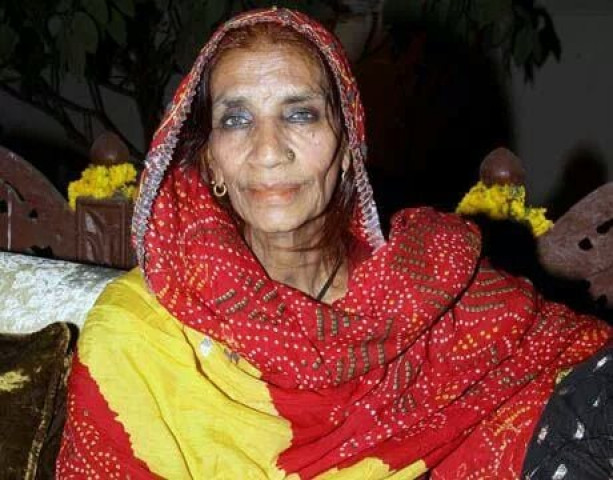Reshma, Pakistan’s ‘first lady’ of folk music
Reshma was best known for her distinctive rendition of Punjabi folk songs.

Reshma, who died earlier this week after a battle with throat cancer, was best known for her distinctive rendition of Punjabi folk songs. PHOTO: REUTERS
Reshma, who died earlier this week after a battle with throat cancer, was best known for her distinctive rendition of Punjabi folk songs. For her fans, she was the “Nightingale of the Desert” and her death at the age of 66 was a fresh blow to the arts in Pakistan, coming a year after ghazal singer Mehdi Hassan’s death.
Despite her fame, Reshma was modest. She dressed conservatively in a salwar kameez and was rarely seen without a dupatta covering her head. And her mehfils (public performances) were devoid of histrionics.
“Reshma was a magician who could kill with her voice. She was the first lady of Pakistani folk music,” Shaukat Ali, Reshma’s friend and a folk singer, said by phone, speaking from Lahore, Pakistan.
Reshma’s talent was discovered in the 1960′s by a former Radio Pakistan producer, who heard her singing at the shrine of a Sufi saint. The young girl, used to singing in the open, was petrified when she saw a recording studio for the first time.
“She refused to enter the studio, and said a man was standing inside, referring to the pillar-like structure that was actually the microphone,” said Sarvat Ali Khan, a Radio Pakistan producer, whose father composed most of her songs.
Reshma made a successful debut on radio, and her rendition of “Dama Dam Mast Qalandar” — a traditional song praising a Sufi mystic in spiritual ecstasy — was her first hit.
Perhaps her most famous song is “Lambi Judaai” (A Long Separation), which Reshma sang for her Bollywood debut in 1983.
Indian filmmaker Subhash Ghai heard Reshma singing live during her first visit to the country of her birth. It was the early 1980′s, a time when the singer met late Prime Minister Indira Gandhi and sang at private mehfils, including one at filmmaker and actor Raj Kapoor’s house.
Ghai remembers how Reshma sat still and avoided meeting anyone’s eyes while singing.
“Her singing was so powerful that her words resounded without the microphone,” the director said.
Ghai told India Insight that he had to persuade a sweating Reshma to sing for his film “Hero”. The song ‘Lambi Judaai’ put to good use the characteristic forlornness in the singer’s voice and played a part in the film’s success. It was to be Reshma’s signature song in Bollywood.
“Subhashji, I didn’t know this song will be so popular. Wherever I go, people just want to listen to this song,” Reshma later told Ghai, he said.
In 2006, she took a ride on the inaugural Lahore-Amritsar bus service that linked cities in India and Pakistan. In an undated YouTube audio recording from one of her Indian concerts, Reshma referred to the strained relations between the two nations: “If we give each other love and respect, then no witch can destroy us.”
Towards the end of the century, Reshma was diagnosed with cancer, but continued to sing. Her last overseas performance at London’s Brunei Gallery happened more than a decade ago. “The Nomad”, her final album, was released in 2005. Three years later, Pakistani pop singer Atif Aslam paid tribute to her at a show in Karachi.
Reshma’s last photograph could possibly be in this blog post by a Pakistani journalist, in which the singer — frail, ailing and barely recognizable — is seen with her friend Shaukat Ali.
Reshma shunned commercial success during her career, and according to Ghai, had no money left when she died. Media reports said former Pakistan President Pervez Musharraf helped her pay off a loan with a grant of 1 million rupees.
“Our country has seven musical notes, like any country. The eighth note that Reshma had is now gone,” Sawan Khan said of his mother, quoting a line from a Pakistani newspaper.



















COMMENTS
Comments are moderated and generally will be posted if they are on-topic and not abusive.
For more information, please see our Comments FAQ